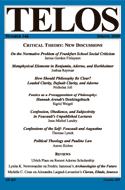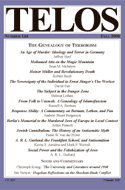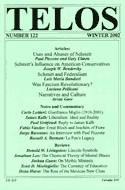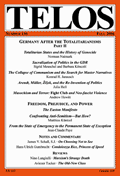By Philip Crone · Tuesday, November 10, 2009 Each Tuesday in the TELOSscope blog, we reach back into the archives and highlight an article whose critical insights continue to illuminate our thinking and challenge our assumptions. Today, Philip Crone looks two articles about the Frankfurt School: Ben Morgan’s “The Project of the Frankfurt School,” from Telos 119 (Spring 2001), and James Gordon Finlayson’s “Morality and Critical Theory: On the Normative Problem of Frankfurt School Social Criticisms,”from Telos 146 (Spring 2009).
In an earlier post on the TELOSscope blog, Nicole Burgoyne highlighted a 2001 interview with Paul Piccone in which he discussed the appearance of Telos in the 1960s. Piccone listed a number of ideological currents that played major formative roles in the early years of Telos, including Frankfurt School critical theory. Forty years after the first issue of Telos was published the journal is still going strong, but can the same be said of the critical theory of the Frankfurt School? The Frankfurt School itself long predates Telos; the beginnings of its program can be traced to the 1920s when the Institute for Social Research was founded by Carl Grünberg. The Frankfurt School, or at least what is known as its “first generation,” reached its apex with the publication of the second edition of Max Horkheimer and Theodor Adorno’s Dialectic of Enlightenment in 1947. While thinkers influenced by this first generation continue to exert enormous intellectual influence, the ideas of the original group itself have waned.
Continue reading →
By Marcus Michelsen · Tuesday, October 27, 2009 Each Tuesday in the TELOSscope blog, we reach back into the archives and highlight an article whose critical insights continue to illuminate our thinking and challenge our assumptions. Today, Marcus Michelson looks at Jean-Michel Landry’s “Confession, Obedience, and Subjectivity: Michel Foucault’s Unpublished Lectures On the Government of the Living,” from Telos 146 (Spring 2009).
 Why do we obey? Even when people rebel, it seems they simply reconstitute a form of obedience. We all know the old cliché “they aren’t rebels, they’re just following a ‘rebellious’ social code.” The way people dress, their hairstyle, tattoos, earrings, piercings, etc., only seem to reinforce our belief in their obedience to well-defined social practices. Even if we aren’t all playing by the same rules, we are all playing by rules. Do we even know what it would mean anymore to rebel? In the meantime, cultural critics admonish our decline, criticizing us for adhering to more philistine, insipid, or self-defeating values. But doesn’t this criticism amount to saying that we are just obeying the wrong thing, whereas obedience itself is simply presupposed? Could obedience really be ubiquitous, and if so, how did we get this way? On the other hand, how can we describe a legitimate form of autonomy? Why do we obey? Even when people rebel, it seems they simply reconstitute a form of obedience. We all know the old cliché “they aren’t rebels, they’re just following a ‘rebellious’ social code.” The way people dress, their hairstyle, tattoos, earrings, piercings, etc., only seem to reinforce our belief in their obedience to well-defined social practices. Even if we aren’t all playing by the same rules, we are all playing by rules. Do we even know what it would mean anymore to rebel? In the meantime, cultural critics admonish our decline, criticizing us for adhering to more philistine, insipid, or self-defeating values. But doesn’t this criticism amount to saying that we are just obeying the wrong thing, whereas obedience itself is simply presupposed? Could obedience really be ubiquitous, and if so, how did we get this way? On the other hand, how can we describe a legitimate form of autonomy?
Continue reading →
By Etel Sverdlov · Tuesday, October 20, 2009 Each Tuesday in the TELOSscope blog, we reach back into the archives and highlight an article whose critical insights continue to illuminate our thinking and challenge our assumptions. Today, Etel Sverdlov looks at Arden Pennell’s “Why Are They So Happy? Berlin’s Memorial to the Murdered Jews of Europe in Local Context,” from Telos 144 (Fall 2008).
 In all honesty, children playing under the shadow of the presidential statue in the Lincoln Memorial, sweethearts embracing behind the slabs of the World War II plaza, or families picnicking in the shade of the Vietnam Memorial, seem odd and incongruous. Monuments are rarely expected to act as recreational spaces. Rather, the heavy subject matter solemnified in each should lend to reflection and concentration. The opposite, however, is the case with the Berlin Memorial to the Murdered Jews of Europe, where the plaza filled with uniform rectangles of various heights provides visitors with a place to sunbathe, to cuddle, to play, to eat. In her article “Why Are They So Happy? Berlin’s Memorial to the Murdered Jews of Europe in Local Context,” from Telos 144 (Fall 2008), Arden Parnell examines the cultural history of the area in order to explain why the monument has been adopted and used with such unaccustomed cheerfulness. In all honesty, children playing under the shadow of the presidential statue in the Lincoln Memorial, sweethearts embracing behind the slabs of the World War II plaza, or families picnicking in the shade of the Vietnam Memorial, seem odd and incongruous. Monuments are rarely expected to act as recreational spaces. Rather, the heavy subject matter solemnified in each should lend to reflection and concentration. The opposite, however, is the case with the Berlin Memorial to the Murdered Jews of Europe, where the plaza filled with uniform rectangles of various heights provides visitors with a place to sunbathe, to cuddle, to play, to eat. In her article “Why Are They So Happy? Berlin’s Memorial to the Murdered Jews of Europe in Local Context,” from Telos 144 (Fall 2008), Arden Parnell examines the cultural history of the area in order to explain why the monument has been adopted and used with such unaccustomed cheerfulness.
Continue reading →
By Philip Crone · Tuesday, October 13, 2009 Each Tuesday in the TELOSscope blog, we reach back into the archives and highlight an article whose critical insights continue to illuminate our thinking and challenge our assumptions. Today, Philip Crone looks at Fabio Vander’s “Kant and Schmitt on Preemptive War,” from Telos 125 (Fall 2002), and Michael Mack’s “Toward a Redefinition of Europe’s Political Identity: Spinoza’s Non-hierarchical Vision,” from Telos 145 (Winter 2008).
In the wake of the terrorist attacks of September 11, President Bush addressed a joint session of Congress, announcing the global war on terrorism and articulating the Bush doctrine of preemptive military action. His speech was followed shortly by the American-led invasion of Afghanistan, and a year later his administration began to make its case for war against Iraq. The formal campaign for the war began with President Bush’s address to the UN Security Council on September 12 and eventually led to the adoption of UN Security Council Resolution 1441, which called for “serious consequences” should Iraq not comply with weapons inspections.
Continue reading →
By Nicole Burgoyne · Tuesday, October 6, 2009 Each Tuesday in the TELOSscope blog, we reach back into the archives and highlight an article whose critical insights continue to illuminate our thinking and challenge our assumptions. Today, Nicole Burgoyne looks at Jonathan Leo’s “The Chemical Theory of Mental Illness,” from Telos 122 (Winter 2002).
 Even the first-time reader of Freud recognizes some outdated theory, in part because he or she has already heard Freudian psychology made fun of as part of the pop culture understanding of psychotherapy. But has Freud’s legacy—talk therapy—become obsolete in education as well as in practice? In his 2002 article “The Chemical Theory of Mental Illness,” Jonathan Leo reviews two books that analyze a still dominant trend toward biological psychiatry in modern day academia and the general public. Leo takes a closer look at the idea that mental illnesses are just like other diseases, chemical imbalances that should be rectified by introducing ameliorating substances. Even the first-time reader of Freud recognizes some outdated theory, in part because he or she has already heard Freudian psychology made fun of as part of the pop culture understanding of psychotherapy. But has Freud’s legacy—talk therapy—become obsolete in education as well as in practice? In his 2002 article “The Chemical Theory of Mental Illness,” Jonathan Leo reviews two books that analyze a still dominant trend toward biological psychiatry in modern day academia and the general public. Leo takes a closer look at the idea that mental illnesses are just like other diseases, chemical imbalances that should be rectified by introducing ameliorating substances.
Continue reading →
By Marcus Michelsen · Tuesday, September 29, 2009 Each Tuesday in the TELOSscope blog, we reach back into the archives and highlight an article whose critical insights continue to illuminate our thinking and challenge our assumptions. Today, Marcus Michelsen looks at Jean-Claude Paye’s “From the State of Emergency to the Permanent State of Exception,” from Telos 136 (Fall 2006).
 How long ago was 9/11? Is this really a new era? What does it look like? For many, for perhaps all of us, the terrorist attacks eight years ago came as a surprise and brought us to question our understanding of the world around us. Our answers have emerged in renewed and reinvigorated passions for social and international justice. Collectively, however, there is no one vision we can all subscribe to. Some blame the United States for the terrorist attacks; others call for the government to hunt down the terrorists and kill them. In the heat of the moment, emotions flare and opinions are erratic. How long ago was 9/11? Is this really a new era? What does it look like? For many, for perhaps all of us, the terrorist attacks eight years ago came as a surprise and brought us to question our understanding of the world around us. Our answers have emerged in renewed and reinvigorated passions for social and international justice. Collectively, however, there is no one vision we can all subscribe to. Some blame the United States for the terrorist attacks; others call for the government to hunt down the terrorists and kill them. In the heat of the moment, emotions flare and opinions are erratic.
Continue reading →
|
|
 Why do we obey? Even when people rebel, it seems they simply reconstitute a form of obedience. We all know the old cliché “they aren’t rebels, they’re just following a ‘rebellious’ social code.” The way people dress, their hairstyle, tattoos, earrings, piercings, etc., only seem to reinforce our belief in their obedience to well-defined social practices. Even if we aren’t all playing by the same rules, we are all playing by rules. Do we even know what it would mean anymore to rebel? In the meantime, cultural critics admonish our decline, criticizing us for adhering to more philistine, insipid, or self-defeating values. But doesn’t this criticism amount to saying that we are just obeying the wrong thing, whereas obedience itself is simply presupposed? Could obedience really be ubiquitous, and if so, how did we get this way? On the other hand, how can we describe a legitimate form of autonomy?
Why do we obey? Even when people rebel, it seems they simply reconstitute a form of obedience. We all know the old cliché “they aren’t rebels, they’re just following a ‘rebellious’ social code.” The way people dress, their hairstyle, tattoos, earrings, piercings, etc., only seem to reinforce our belief in their obedience to well-defined social practices. Even if we aren’t all playing by the same rules, we are all playing by rules. Do we even know what it would mean anymore to rebel? In the meantime, cultural critics admonish our decline, criticizing us for adhering to more philistine, insipid, or self-defeating values. But doesn’t this criticism amount to saying that we are just obeying the wrong thing, whereas obedience itself is simply presupposed? Could obedience really be ubiquitous, and if so, how did we get this way? On the other hand, how can we describe a legitimate form of autonomy?  In all honesty, children playing under the shadow of the presidential statue in the Lincoln Memorial, sweethearts embracing behind the slabs of the World War II plaza, or families picnicking in the shade of the Vietnam Memorial, seem odd and incongruous. Monuments are rarely expected to act as recreational spaces. Rather, the heavy subject matter solemnified in each should lend to reflection and concentration. The opposite, however, is the case with the Berlin Memorial to the Murdered Jews of Europe, where the plaza filled with uniform rectangles of various heights provides visitors with a place to sunbathe, to cuddle, to play, to eat. In her article
In all honesty, children playing under the shadow of the presidential statue in the Lincoln Memorial, sweethearts embracing behind the slabs of the World War II plaza, or families picnicking in the shade of the Vietnam Memorial, seem odd and incongruous. Monuments are rarely expected to act as recreational spaces. Rather, the heavy subject matter solemnified in each should lend to reflection and concentration. The opposite, however, is the case with the Berlin Memorial to the Murdered Jews of Europe, where the plaza filled with uniform rectangles of various heights provides visitors with a place to sunbathe, to cuddle, to play, to eat. In her article  Even the first-time reader of Freud recognizes some outdated theory, in part because he or she has already heard Freudian psychology made fun of as part of the pop culture understanding of psychotherapy. But has Freud’s legacy—talk therapy—become obsolete in education as well as in practice? In his 2002 article
Even the first-time reader of Freud recognizes some outdated theory, in part because he or she has already heard Freudian psychology made fun of as part of the pop culture understanding of psychotherapy. But has Freud’s legacy—talk therapy—become obsolete in education as well as in practice? In his 2002 article  How long ago was 9/11? Is this really a new era? What does it look like? For many, for perhaps all of us, the terrorist attacks eight years ago came as a surprise and brought us to question our understanding of the world around us. Our answers have emerged in renewed and reinvigorated passions for social and international justice. Collectively, however, there is no one vision we can all subscribe to. Some blame the United States for the terrorist attacks; others call for the government to hunt down the terrorists and kill them. In the heat of the moment, emotions flare and opinions are erratic.
How long ago was 9/11? Is this really a new era? What does it look like? For many, for perhaps all of us, the terrorist attacks eight years ago came as a surprise and brought us to question our understanding of the world around us. Our answers have emerged in renewed and reinvigorated passions for social and international justice. Collectively, however, there is no one vision we can all subscribe to. Some blame the United States for the terrorist attacks; others call for the government to hunt down the terrorists and kill them. In the heat of the moment, emotions flare and opinions are erratic. 

